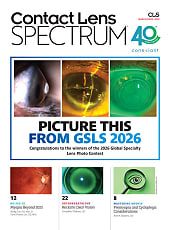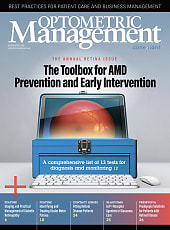This month, Optometric Management features its “Practicing Medical Optometry” (PMO) section on diabetes care. The issue also recognizes the importance of communication skills. Understanding the impact of these skills in both practice and life, the late Dr. Jack Runninger, former OM editor and columnist, compiled many of his columns into a book, which he titled “You’ll Do Great If You Communicate.”
Here, let me mention just a few of the examples of the importance of communication found in this issue of OM:
Chief Optometric Editor Dr. April Jasper shares an example of the power of communication in “OD to OD” (p. 4). She writes that at the right time, “a simple ‘thank you,’ a smile, or a compliment” can brighten someone’s day, “and shift them into a more positive mindset, which can then lead to healthier relationships in their lives.”
COMMUNICATION WITH PATIENTS AND THE HEALTH CARE TEAM
Communication, in the form of providing education to diabetic patients and their caregivers, is at the core the article, “Address This Top Challenge in Managing Diabetes” (p. 16). The authors, Drs. Mo-hammad Rafieetary and Salar Rafieetary, write that education on the importance of screening and follow-up visits “can result in earlier diagnosis and better visual outcomes” for patients.
Another example: In the “Treatment” section of the PMO article, “Consider the Cornea in Diabetes” (p. 22), author Dr. Cecelia Koetting writes of the need for optometrists to provide patient education and communicate with the patient’s treating physician.
In “Keep Tabs on Diabetes” (p.31), Dr. Sherrol A. Reynolds presents an overview of tools that help monitor disease progression, including patient devices, such as continuous glucose monitors. The OD’s recommendations can help patients learn of the role these devices play in their care.
The success of the co-managing patients who have diabetes “depends on productively communicating clinical findings with other members of the patient’s health care team,” writes Dr. Timothy Earley in this month’s “iBusiness” column (p. 56). Dr. Early offers several tips for improving communication, from advanced EHR systems to an often-overlooked but highly effective method — the phone call. OM




